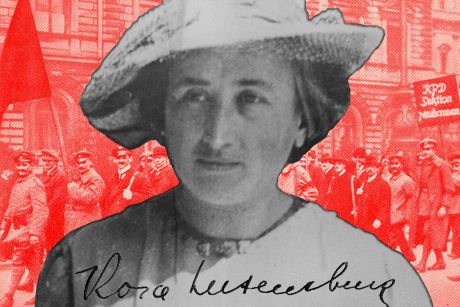Features
You are here
Remembering Rosa Luxemburg

January 15, 2017
Almost a century ago today, on January 15, 1919, one of the greatest Marxist thinkers and fighters was murdered. Her name was Rosa Luxemburg. And although she is gone, those of us here today can continue her legacy in the struggle for working class self-emancipation and the creation of socialism. To do this we must read her works spanning across her lifetime. Why read Luxemburg, though? There are many brilliant aspects that made her who she was, but we need only look at four of them to give enough reason for anyone to pick up one of her many examples of genius. Here are four reasons to read ROSA.
Ruthless critic of all that exists. It was this method – first formulated by the 25 year old Karl Marx in a letter – which was a hallmark of Rosa Luxemburg. At a young age she disapproved of the Tsar, rejected the social norms that bound women at the time, and joined an illegal socialist party when she was just 15. Later in life she was vocal of her criticisms within the Social Democratic Party of Germany (SPD): showcasing how the reformist revision of socialism in fact prevented the creation of socialism in favour of the maintenance of capitalism, then years after denouncing the chauvinistic leadership of the party for their support of Germany in the bloodbath of the First World War, and ultimately breaking from the party to create the revolutionary and genuinely Marxist alternative called the Spartacus League. Furthermore, beyond the SPD, she was unflinching in her simultaneous criticism and support of the Bolshevik leadership at the head of the 1917 Russian Revolution – prophetically warning against the limiting of workers’ democracy, which history shows helped Stalin rise to counter-revolutionary power.
Optimist. There was always hope in Luxemburg’s heart, as is most obvious in her letters from prison. She never allowed the misery of the world defeat her. Being born physically disabled, a woman, Polish, and Jewish, she was met with great hostility – even from her fellow socialists. Being a socialist herself she was hunted by governments that knew what a threat her voice and ideas could be to their rule over the toiling masses. Luxemburg saw the SPD – the mass workers’ party in Germany, considered by most to be the stronghold of international socialism – crumble at the onset of World War, she was outcast as being too much of a revolutionary Marxist by many she once called friends in the movement, and imprisoned for over half a decade throughout her life for her passionate organising. Whether surrounded by war, reformism, bureaucracy, prison walls, or vile hate, Luxemburg stood strong. Her ardent belief that the working class could liberate itself and build the world anew on the ashes of the old, in absolute freedom as opposed to the exploitation and oppression which bind the millions of us today – this vision of Luxemburg’s was all enduring.
Socialist revolutionary. It comes as no surprise that many have called Luxemburg the greatest Marxist after Marx himself. Despite making mistakes, which no one can avoid, she upheld the revolutionary socialism of Marx to the last beat of her heart. Her most popular feat was defending Marxism at the turn of the century from being stripped of all its essence by the reformists. Besides this battle against reformism – which was never-ending – Luxemburg made theoretical advancements about the class struggle based off the mass strikes which sprung across Russia and lead to the 1905 Russian Revolution, she contributed to Marx’s economic analysis of the inner-workings of capitalism and imperialism, while also attacking the First World War and the leadership of the SPD which turned their backs on the socialist principle of internationalism. Perhaps her greatest act, though, was simply maintaining the Marxist principle of working class self-emancipation, making it clear to all the inherent connection Marx’s socialism has with democracy – and, therefore, the free and democratic methods necessary for any genuine revolutionary vanguard party.
Assassinated. The German Revolution had started in October of 1918, while Luxemburg was still imprisoned. After the first week of November, she was freed. The next day her fellow Spartacus League founder, Karl Liebknecht, declared to Berlin workers the creation of a “Free Socialist Republic.” Thrown into revolution, Luxemburg went forward bravely. In December they created a new programme for the League, and had a conference which resulted in the League becoming the Communist Party of Germany. A few short days into the New Year, revolutionary unrest swept through Berlin again as a wave of workers went on strike and entered the streets armed with rifles and hope – the Spartacus Uprising was upon them. The Social Democrats of the SPD, now at the head of government and rid of any revolutionary Marxist elements, ordered the Freikorps (essentially a far-right militia) to drown the Revolution in blood. Luxemburg and Liebknecht were captured and tortured. Then execution orders came. The butt of a rifle met her skull, a bullet was then shot through, and her body was dumped into a freezing river. A wonderful woman with an incredible mind was silenced forever.
With a life cut so short at age 47 we’re left painfully wondering what excellent insights might Rosa have come up with and shared had she lived on into the 20th Century, to fight the rise of both fascism and Stalinism. We can at least console ourselves with the immense body of work she left behind for us to learn from, to advance the struggle today and tomorrow. Is it necessary to list any more reasons? If one cries for further convincing, they need only pause and listen carefully to hear Luxemburg’s thunderous ideas, echoing the words she gave the German Revolution mere hours before her death: “I was, I am, I shall be!”
Section:









